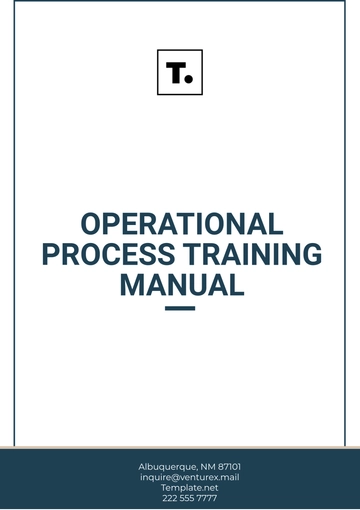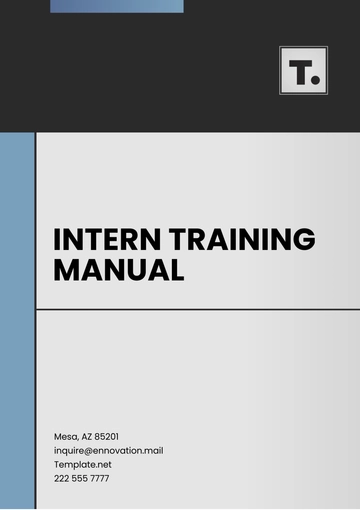Free Pet Care Training Manual

1. Introduction to Pet Care
1.1 Overview of Pet Care
Pet care is a crucial aspect of responsible pet ownership. As pet owners, it is our responsibility to provide the best possible environment for our pets. This includes not only feeding them but also ensuring their safety, comfort, and well-being in all areas of their lives. Pet care involves understanding the physical, emotional, and social needs of animals and fulfilling these requirements with dedication and compassion. The responsibility of caring for a pet is a long-term commitment that can span many years, depending on the species.
At [Your Company Name], we believe that proper education is key to ensuring that all pets live happy, healthy, and fulfilling lives. With advancements in pet care techniques, products, and services continuing to evolve as we enter [2050] and beyond, it is important for pet owners to stay updated and well-informed. This manual is designed to guide pet owners through the essential aspects of pet care, with a focus on best practices that promote both health and happiness for animals.
1.2 Importance of Proper Pet Care
Proper pet care is essential for a variety of reasons, each of which plays a significant role in the overall health and well-being of an animal. Whether you are caring for a dog, cat, rabbit, or reptile, providing quality care ensures that your pet leads a long and happy life.
Health and Longevity: Proper nutrition, regular exercise, preventive medical care, and hygiene practices contribute directly to a pet's health. Just like humans, pets are prone to illness, but with proper care, many diseases can be prevented or managed.
Behavioral Health: Pets that receive adequate mental and physical stimulation are less likely to develop behavioral issues such as anxiety, aggression, or destructive habits. Socializing your pet from a young age and providing consistent training can help develop well-adjusted and confident animals.
Safety: Keeping pets safe is a significant part of responsible ownership. This involves providing a safe home environment, protecting them from hazards (e.g., toxic plants, dangerous foods), and ensuring they have proper identification, such as a collar with tags or a microchip.
2. Understanding Pet Needs
2.1 Feeding and Nutrition
Feeding your pet properly is one of the most important aspects of their care. Understanding the nutritional needs of your pet based on their species, age, and health status will ensure they thrive and maintain a healthy weight. The nutritional requirements for pets are as diverse as the animals themselves, so it's essential to understand what your pet needs to grow, maintain energy levels, and stay healthy throughout their life.
2.1.1 Types of Pet Food
There are several types of pet food available, and it is important to select one that is appropriate for your pet’s individual needs.
Dry Food (Kibble): Dry food is convenient, shelf-stable, and often more affordable than wet food. It is suitable for most dogs and cats and helps to keep their teeth clean due to the crunchy texture. However, it may not provide the moisture that some pets require, especially those prone to urinary tract issues.
Wet Food: Wet food is generally more palatable for pets, especially those who are finicky eaters or have dental issues. It is often richer in protein and moisture, making it a great choice for pets that are underweight or elderly. However, it has a shorter shelf life and can be more expensive than dry food.
Raw Food: Raw feeding is a diet that mimics what pets would eat in the wild. It includes raw meat, bones, and organs, and some owners believe it provides nutritional benefits such as better digestion and coat condition. However, it requires careful handling and balance to ensure it is safe and nutritionally complete.
2.1.2 Daily Feeding Guidelines
When determining how much to feed your pet, it’s important to follow recommended guidelines and adjust based on your pet’s size, age, and activity level.
Cats: Adult cats generally need between [200] to [300] calories per day, depending on factors like activity levels and breed. Overfeeding can lead to obesity, a common issue among housecats, while underfeeding can result in malnutrition.
Dogs: Daily calorie intake varies greatly depending on the size and breed of the dog. Small dogs may need between [150] and [400] calories daily, while larger breeds require anywhere from [800] to [1,500] calories. It’s also important to adjust portion sizes if your dog is gaining or losing weight.
Other Pets: For rabbits, guinea pigs, and birds, a varied diet is crucial. Rabbits need an unlimited supply of hay, fresh leafy greens, and some pellets, while guinea pigs benefit from additional vitamin C in their diet. Birds should be offered a mix of seeds, fruits, and vegetables.
2.1.3 Hydration
Water is essential for your pet’s health, and it is often overlooked in the daily care routine. Dehydration can lead to serious health complications such as kidney failure and urinary issues. Pets should always have access to clean, fresh water.
Dogs and Cats: On average, pets should drink between [50] and [100] mL of water per kilogram of body weight each day. If your pet drinks significantly more or less, it could be a sign of a health issue such as diabetes or kidney disease.
Small Animals and Birds: Small pets, such as hamsters and rabbits, require access to fresh water at all times. Birds need fresh water, and some species prefer to drink from shallow bowls or cups rather than water bottles.
2.2 Grooming and Hygiene
Regular grooming is not only about keeping your pet looking good—it is a necessary part of maintaining their overall health. Grooming allows you to check for parasites, injuries, or signs of illness that may otherwise go unnoticed. Moreover, grooming helps prevent skin infections, matting, and other hygiene-related issues.
2.2.1 Bathing
Bathing your pet can be an enjoyable bonding experience, but it should only be done when necessary. Too much bathing can strip the skin of natural oils, leading to dryness and irritation.
Dogs: Depending on the breed and lifestyle, dogs typically need a bath every four to six weeks. However, some dogs may require more frequent baths, especially if they have skin conditions or if they’ve been playing outside in dirt or mud.
Cats: Cats are generally good at grooming themselves, but they may require occasional baths if they become dirty or have skin issues. Regular bathing is usually unnecessary unless advised by a veterinarian.
2.2.2 Brushing
Brushing your pet’s fur helps to remove dead hair, reduce shedding, and prevent mats or tangles, especially in long-haired pets. Brushing also stimulates the skin and can prevent skin issues by improving circulation.
Dogs: Depending on the breed, dogs with long, thick coats may require brushing every day. Short-haired dogs may only need brushing once a week to remove loose hair.
Cats: Cats with long fur should be brushed daily, while short-haired cats may require brushing every few days.
2.2.3 Nail Clipping
Regular nail clipping is essential to prevent overgrowth, which can cause discomfort, difficulty walking, or even injury. If your pet's nails become too long, they may start to curl inward or split.
Dogs: Small dogs tend to need more frequent nail trimming compared to large breeds. Generally, a dog’s nails should be clipped every [3] to [4] weeks.
Cats: Most cats do not need nail trimming as often, but it is still necessary to trim their claws every [4] to [6] weeks to prevent injury.
2.3 Exercise and Mental Stimulation
Exercise is critical for maintaining your pet’s physical health. Just like humans, pets need regular physical activity to stay in shape, avoid obesity, and burn off excess energy. Mental stimulation is also essential for maintaining their cognitive function and preventing boredom-induced behavior problems.
2.3.1 Exercise for Dogs
Dogs need regular exercise to stay healthy and happy. The amount of exercise needed depends on the dog’s size, breed, and age.
Small Breeds: Small dogs, like Dachshunds and Chihuahuas, typically require [30] to [45] minutes of exercise per day. They can be content with short walks and play sessions.
Large Breeds: Larger dogs, like Golden Retrievers and German Shepherds, often require [1] to [2] hours of physical activity daily. Activities like hiking, running, and playing fetch are ideal for large dogs.
2.3.2 Exercise for Cats
While cats are generally less active than dogs, they still need regular playtime to stay fit and mentally stimulated. Interactive toys, such as feather wands, laser pointers, and puzzle feeders, can provide a great source of mental and physical exercise.
Indoor Cats: Cats that live indoors may not have as much opportunity to exercise as outdoor cats, so it's important to provide them with engaging toys and activities to keep them active. Aim for at least [15] to [30] minutes of playtime daily.
2.3.3 Other Pets
Smaller pets, such as rabbits and guinea pigs, also need exercise, but their activity needs are different.
Rabbits: Rabbits require access to a large, safe area where they can hop around and stretch their legs. They should be allowed to roam in a secured area for [1] to [2] hours each day.
Birds: Birds should be allowed time outside their cages to fly and exercise their wings. Offering them a variety of perches, swings, and climbing toys can help keep them physically active.
3. Health and Veterinary Care
3.1 Preventive Health Care
Preventive health care is one of the most important aspects of keeping your pet healthy. Regular visits to the veterinarian are essential for vaccinations, parasite prevention, and early detection of potential health problems.
3.1.1 Vaccinations
Vaccinations help protect your pet from a variety of dangerous diseases. Keeping your pet's vaccinations up to date is vital in preventing serious illnesses. Vaccines vary depending on the species, age, and lifestyle of the pet.
Dogs: Dogs require vaccinations for diseases like rabies, parvovirus, distemper, and hepatitis. Puppies should receive their first vaccinations at around [8] to [10] weeks of age, with booster shots every [1] to [3] years thereafter.
Cats: Cats also need vaccinations for feline distemper, feline herpesvirus, rabies, and feline leukemia. Kittens usually begin their vaccinations at around [8] weeks old, with boosters administered throughout their first year.
3.1.2 Parasite Prevention
Fleas, ticks, and worms are common parasites that can affect pets. They can cause various health problems, including skin irritations, anemia, and internal organ damage. Regular parasite prevention, including flea and tick treatments, is essential.
Dogs and Cats: There are a variety of topical treatments, oral medications, and collars available to prevent fleas and ticks. It's important to follow the recommended schedule to ensure the treatments are effective.
Small Animals: Rabbits, guinea pigs, and other small pets can also be affected by parasites, although they are less likely to be exposed to fleas or ticks than dogs and cats. However, they may still need deworming treatments from time to time.
3.2 Emergency Care and First Aid
Accidents can happen at any time, and it’s important to be prepared for emergencies. Basic knowledge of first aid can help you manage your pet’s injuries or illnesses until you can get them to a veterinary professional.
First Aid Kit: A well-stocked first aid kit should include basic supplies like gauze pads, bandages, tweezers, scissors, antiseptic wipes, and a thermometer. It’s also a good idea to keep your vet’s contact information and an emergency number on hand.
Signs of Illness or Injury: If your pet shows signs of severe lethargy, excessive vomiting, or changes in behavior, it may indicate a medical emergency. In such cases, contact your veterinarian immediately.
4. Specialized Care for Different Pet Types
4.1 Dog Care
Dogs are one of the most popular pets worldwide, known for their loyalty, intelligence, and companionship. Caring for dogs involves meeting their unique needs in terms of diet, exercise, training, and health. Every breed may require different care based on their size, temperament, and activity level.
4.1.1 Breed-Specific Care
Each dog breed has its own set of characteristics, including size, energy level, and potential health concerns. Understanding these traits is essential for proper care.
Small Breeds: Small dogs like Chihuahuas, Dachshunds, and Pomeranians may have specific health concerns such as dental issues or heart problems. They generally require less exercise than larger breeds but still need mental stimulation and training.
Large Breeds: Larger dogs, such as Great Danes, Saint Bernards, and German Shepherds, may be prone to joint issues, like hip dysplasia, and may require a diet that promotes joint health. These dogs often need more space and regular exercise to stay healthy and prevent obesity.
Active Breeds: Active breeds like Border Collies, Labrador Retrievers, and Australian Shepherds have high energy levels and require regular, vigorous exercise to keep them happy and healthy. They also benefit from mental stimulation, such as puzzle toys and advanced training.
4.1.2 Health Maintenance
Routine health maintenance is vital for keeping dogs healthy and preventing the development of serious conditions.
Vaccinations: Dogs need regular vaccinations against diseases such as rabies, parvovirus, distemper, and hepatitis. Puppies should receive their initial vaccinations at around [8] to [10] weeks of age, with subsequent boosters as recommended by your vet.
Parasite Control: Dogs are prone to fleas, ticks, and intestinal worms. Preventive medications should be given year-round to protect against these parasites. Your veterinarian can recommend the best options for your dog, depending on their age, size, and lifestyle.
Dental Health: Dental health is often overlooked but plays a significant role in overall well-being. Regular teeth brushing and dental check-ups can prevent periodontal disease, which can lead to serious infections and organ damage.
4.1.3 Training and Socialization
Training is crucial for building a healthy relationship with your dog and ensuring they are well-behaved and socialized.
Puppy Training: Puppies are highly impressionable and should undergo early socialization and basic obedience training. Teaching them essential commands, such as "sit," "stay," and "come," will lay the groundwork for good behavior throughout their life.
Socialization: Introducing your dog to a variety of people, places, and other animals can help prevent behavioral issues, such as aggression or fear. Proper socialization helps your dog become well-adjusted and comfortable in different environments.
4.2 Cat Care
Cats are independent animals but still require a great deal of attention and care from their owners. They are known for their cleanliness, intelligence, and aloof nature. To ensure that your cat lives a long and healthy life, it’s important to address their needs in nutrition, health, exercise, and grooming.
4.2.1 Nutrition and Feeding
Cats are obligate carnivores, meaning they require a diet primarily made up of meat. Their nutritional needs differ significantly from dogs, and providing the right food is crucial to their health.
High-Protein Diet: Cats thrive on a high-protein, meat-based diet. Commercial cat foods should contain quality sources of animal protein like chicken, turkey, or fish. Look for formulas that are designed to meet the nutritional levels established by the Association of American Feed Control Officials (AAFCO).
Portion Control: Overfeeding can lead to obesity in cats, which is a common problem among indoor cats. Cats need fewer calories than dogs, so it's important to measure out their food according to their weight, age, and activity level. A typical adult cat requires between [200] and [300] calories daily.
Wet vs. Dry Food: While both wet and dry foods have benefits, wet food provides additional moisture, which can be beneficial for cats, particularly those prone to urinary tract issues. It also tends to be more palatable, making it a good option for picky eaters.
4.2.2 Health and Grooming
Regular grooming and health checks are essential for maintaining a cat’s overall well-being.
Brushing: Cats with long fur should be brushed daily to prevent mats and tangles. Short-haired cats can be brushed once or twice a week to reduce shedding and hairballs. Brushing also provides an opportunity to check for skin issues or parasites.
Nail Clipping: Regular nail trimming is necessary to prevent scratches and damage to furniture. If you notice your cat's claws are growing too long or becoming hooked, trim them gently using pet nail clippers.
Litter Box Maintenance: A clean litter box is essential for your cat’s hygiene and comfort. Scoop the litter box daily to remove waste and replace the litter regularly to prevent odor buildup and keep your cat happy.
4.2.3 Health Maintenance
Like dogs, cats need regular veterinary checkups to ensure their health. Cats should be vaccinated against diseases such as feline distemper, feline herpesvirus, and rabies.
Vaccinations: Regular vaccinations are essential in preventing life-threatening diseases. Cats should receive their first vaccinations as kittens, followed by booster shots throughout their lives, as recommended by your vet.
Parasite Control: Fleas, ticks, and intestinal worms can affect cats as well. Monthly flea preventatives, along with regular deworming, can help keep your cat free of parasites and reduce the risk of infections.
4.3 Exotic Pets
Exotic pets include reptiles, birds, and small mammals, each of which has unique care requirements. These pets often have specialized diets, habitats, and health needs that differ significantly from traditional pets like dogs and cats. Ensuring the correct environment and care practices for exotic pets is essential to their survival and well-being.
4.3.1 Reptile Care
Reptiles, such as lizards, snakes, and turtles, require specific habitats that mimic their natural environment.
Temperature and Humidity: Reptiles are ectothermic, meaning they rely on external sources of heat to regulate their body temperature. This means you must provide a heat source, such as a heat lamp or heating pad, to ensure they stay within the proper temperature range. Different species require different humidity levels, so it's essential to research your reptile's specific needs.
Lighting: UVB light is critical for reptiles, particularly for species like turtles, bearded dragons, and iguanas, as it helps them synthesize vitamin D3, which is essential for calcium absorption and bone health.
Diet: Reptiles’ diets vary depending on the species. For example, herbivorous reptiles, such as tortoises, need a diet rich in leafy greens and vegetables, while carnivorous reptiles, like snakes, require a diet of mice or other small animals. Be sure to provide fresh food and avoid feeding live prey to species that might be prone to injury.
4.3.2 Bird Care
Birds, including parrots, cockatiels, and canaries, are intelligent and social creatures that require plenty of stimulation and care.
Cage Setup: Birds need cages that are large enough to allow them to move around freely. The cage should have perches, toys, and areas for them to climb. Birds are social animals, so they should have time outside the cage each day to interact with their owners and explore.
Diet: A balanced diet is essential for birds. Most pet birds thrive on a combination of high-quality seeds, pellets, fresh fruits, and vegetables. Some species may also benefit from additional calcium or vitamin supplements.
Socialization: Birds are highly social creatures, and without sufficient interaction, they may develop behavioral issues. Regular playtime and positive reinforcement training can help prevent boredom and destructive behaviors.
4.3.3 Small Mammals
Small mammals, such as guinea pigs, hamsters, and rabbits, make great pets for people with limited space. However, they still require specific care to ensure their health and happiness.
Cage Size: Small mammals need cages large enough for them to move around comfortably. They should also be provided with bedding to burrow in and hide.
Exercise: Many small mammals enjoy running in exercise wheels or tunnels. Regular playtime outside their cages in a safe, enclosed area helps to prevent boredom and allows them to explore.
Diet: Guinea pigs, for example, require a high-fiber diet that includes hay, fresh vegetables, and pellets. Hamsters and rabbits also require fresh foods like leafy greens and carrots, as well as a variety of hay to aid digestion.
5. Conclusion
Pet care is a lifelong responsibility, requiring time, attention, and dedication. Whether you own a dog, cat, or exotic pet, the key to a healthy, happy life for your companion lies in meeting their specific needs. From proper nutrition and exercise to regular grooming and veterinary care, each aspect of pet care plays a critical role in the overall well-being of your pet.
At [Your Company Name], we hope this manual serves as a comprehensive guide to caring for your pets. Always remember that each pet is unique, and their needs will evolve over time. By staying informed, you can provide the best care possible for your beloved companions and ensure that they live long, healthy, and happy lives.
For any additional questions or support, please don’t hesitate to reach out to us at [Your Company Email]. Your pet’s health and happiness are our top priority, and we are here to help you every step of the way.
- 100% Customizable, free editor
- Access 1 Million+ Templates, photo’s & graphics
- Download or share as a template
- Click and replace photos, graphics, text, backgrounds
- Resize, crop, AI write & more
- Access advanced editor
Create a comprehensive guide with the Pet Care Training Manual Template from Template.net. This editable and customizable manual covers training techniques, goals, and timelines. Personalize it with our Ai Editor Tool to tailor the manual to specific pet care needs.





























